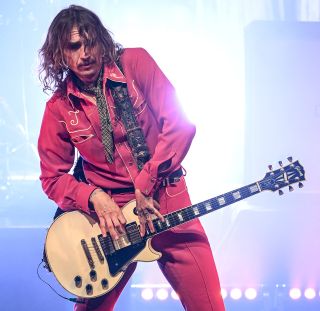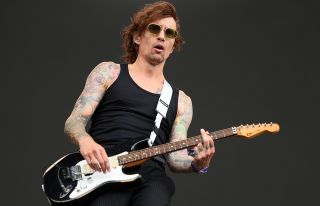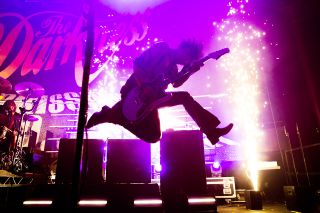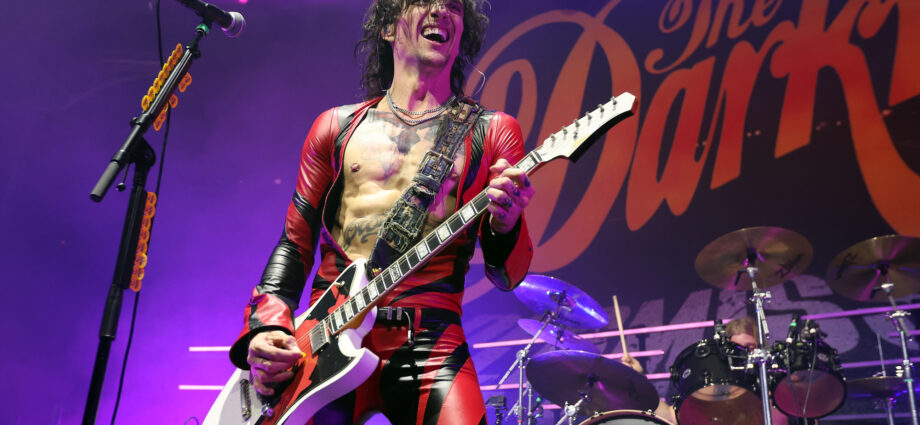If you picture Justin Hawkins from The Darkness in your mind’s eye, you most probably see him holding a Les Paul Custom of some sort – Alpine White, Ebony, or maybe even one of the limited-run Sparkleburst signatures in blue, silver, red, gold and pink from the band’s early years.
That’s changed in recent years with Hawkins opting for a Charvel Super Stock SC1 at points in their live set. But what’s really turned heads over the last 18 months is his Mindhorn offset, made by boutique English manufacturers Atkin Guitars.
The partnership evolved into the JH3001 signature model announced in September, which features a Gotoh Floyd Rose, two custom handwound humbuckers and a heavily-aged Neon nitro finish in pink or yellow. Other details include an Obeche body, a reverse headstock and a quartersawn roasted flame maple neck and fingerboard.
Some might say the empty slot for a middle pickup is reminiscent of Edward Van Halen’s storied Frankenstrat, and the exposed volume/tone pots make it even more unique and striking in design.
“There’s no need for a middle pickup, at least in terms of the applications I’m known for,” says the singer, speaking from the home studio where he films his Justin Hawkins Rides Again videos. “Was I thinking of Eddie when we made the guitar? Yeah, a little bit, actually.
“First and foremost I wanted to bridge the gap between the Les Paul world and the Strat world – mainly due to the pickup selector being on the top horn. I find it too fiddly down at the bottom.
“I just love Strats; they’re really cool guitars. But I’ve never been able to find one that can keep up with [brother, lead guitarist] Dan plugging his Les Paul into a Marshall. I need something that can compete with his side of the stage, and my new 3001 always cuts through. We had to put extra springs in the floater because I was hitting it the way I’d normally hit a hardtail guitar, and now it holds perfectly.”
It’s an instrument that can handle anything he dares to throw at it – a Swiss Army knife of versatility in a studio environment. It’s on sale for £2999 ($3697) and he’s pleased to inform us that orders are being placed from all around the world.

“Atkin, who are based in Kent, are a luthier company better known for really reliable acoustics with brilliant intonation across the fretboard,” he adds. “The same goes for their electrics – they’re up there with the most boutique of companies, designing the super special stuff.”
When did you first learn about the brand?
“Me and Dan went into a music shop on a day off in Manchester. They have a lot of well-curated selections, particularly in the acoustic department. I wanted to try all of them because I was on a mission to buy something nice. The Atkin was the hands-down winner – though unfortunately, it was also the most expensive!
“I paid full price for it and they were thrilled to see me using it on my YouTube. So they reached out, and I started asking them about electrics. They make great stuff across the board, with brilliant machines and people working them. By the end of the year I think I’ll be using Atkin guitars all the time.”
It sounds like you have more Atkin signatures in the works…
“Well, I might ask them to build something that can do exactly what my Les Pauls do, in their own way and with a slightly different scale and neck contour – but still super heavy and iconic. We might even call it the JH3002.
WHEN ATKIN MET HAWKINS – THE BIRTH OF THE JH3001. – YouTube

“We’re looking at doing more, because their guitars just enable me. I’m always looking for interesting things, particularly a power Strat that can do what I need. To play a Strat in The Darkness is really challenging, but they’re really happy to take on the challenge and build me great things. Long may that relationship continue.”
Did it take some time getting used to the Mindhorn after so many years exclusively playing Les Pauls?
“I remember the first show where I replaced my Les Pauls with an Atkin. I actually found it really unusually difficult to bend. When I’m playing the Custom, I’m so used to the way it reacts, I’m almost overbending at times. You don’t have to apply much force to get a good bend out of a Les Paul, I think.
“You have to work harder with something like a Mindhorn. Maybe it’s the scale, or the way the headstock is designed or something. I don’t understand enough about the physics. But it’s made me a more precise player and I love that. It took me a couple of shows to understand it all, and now I’m like, ‘Fuck it, this is all I want to do!’”
So far you’ve released two singles from new album Dreams On Toast – it looks like your brother Dan has switched over to using semi-hollows…
“Yeah! And I actually played that same Gibson ES-355. There are some bluesy lines which called for that Chuck Berry kind of sound before becoming more luxurious elsewhere. I think I used that guitar for my solo on I Hate Myself – the one you see in some of the video clips with a red finish and a Bigsby tailpiece.”
Did you use any of your new Atkin guitars on the new album?
“Most of what I played on this record was done on my Atkin models. There are a couple of songs with a lot of dive-bombery involved, because my new JH3001 signatures are fucking badass!
“I think one of the challenges they had was with the routing for a pickup selector on the top horn, but that’s where I wanted it, because I’m used to playing Les Pauls.
When my brother was playing guitar, his sound came out of my amp. Nobody could explain it!
“My main guitars right now are the Mindhorns and my JH3001s, but I also have two ES-335s and an ES-355. Everything else was Atkin. I don’t think I played a single Les Paul on this album, which is very unusual for me.”
There’s a lick in The Longest Kiss that reminds us of the end of the guitar solo from Weezer’s Buddy Holly. Was that intentional?
“Oh yeah – I hadn’t realized that! I don’t think it was directly influenced by them, to be honest. The stuff I played on the track was what you hear at the beginning after that opening G chord; there’s a Brian May-esque three-part harmony that comes down the neck. I also do the guitars in the middle of the song, and then I’m playing piano for the rest of it.”

While you’ve been very loyal to one guitar brand for the majority of your career, you’ve moved around a fair bit amp-wise. There’s been Marshalls, Mesa, Wizards and, more recently, a Laney signature. What are you plugging into right now?
“My journey was Mesa first. Then I went to Cornfords for a bit, using the Richie Kotzen signature. That was a great amp – really enjoyable to play through. When The Darkness reformed I was on Marshalls, before moving on to Wizard amps.
“I had that signature Laney but it didn’t work out. They made me a rig for touring America and something really strange happened. I don’t know if it was a shielding issue, but when my brother was playing guitar, his sound came out of my amp. Nobody could explain it! He wasn’t even transmitting on the wireless; he always runs a cable.”
That doesn’t quite make sense…
“I know, right?! If I want to hear Dan, I’ll go stand next to his amp – I don’t want him coming out of mine! So I stopped using those. Now I’m using Friedman amps. I love those things and I really love Dave Friedman as well. He’s a funny guy.

“He came to see us in LA last year; we were hanging out after the show and he was one of the driest people I’ve ever met. I now consider myself an Atkin and Friedman ambassador – though nobody has technically elected me as such.”
What made you want to raffle off your guitars, out of curiosity?
“I’ve been doing it for a few years now. When I was first in The Darkness, I left after the second record. At the time, there wasn’t much to give to me as a payout, so I said, ‘I’ll have my guitars and catsuits.’ So the guitars have been mine since the beginning, really.
We started out as a gateway band for those getting into the heavier stuff. That’s probably why we cross over into pop
“I’m getting to that age where I probably don’t need all this stuff and should probably downscale. If it’s not getting played and giving me joy, why shouldn’t somebody else have it?
“Raffles are a bit of fun. People get more engaged in the process of unloading an iconic guitar. I’m going to do other raffles that aren’t memorabilia-based, like this 1971 Strat I have in Olympic White.”
We haven’t seen you with that.
“It’s a real player’s grade one, a proper bluesman’s guitar, owned by somebody in Southampton who played every night in the local bars. It’s completely aged and all done naturally; it’s hardly got any paint left on it. There’s a black scratchplate that’s been retrofitted, like you’ll find on a lot of Strats from that period.
“What I like about the 1971 Strats is the four-bolt neck plate and the big headstock. They look really nice. I’ll raffle that off – not to make money on it, but just to get a fair price and in return give somebody something really cool. A lot of my fans seem to love taking part. It’s only three quid to win a great guitar.”
You’ve crossed into the mainstream more than most rock bands could ever dream of – even supporting Lady Gaga on her 2012 European stadium tour. But the Taylor Swift explosion last year with I Believe in a Thing Called Love was still quite unexpected.
“It was just Taylor and her partner at the tennis, probably drinking Pimms, because that’s what people do there. They were having fun singing along to our number. That one in particular is quite synonymous with tennis because of the title and the term ‘love’ in scoring. It was just luck, really.
“Then somebody incredibly powerful and famous dances along to it; and the next thing you know, you’re in the charts again! It is strange. I’ve had friends texting me saying, ‘I wish Taylor Swift would dance to my music!’ And I was like, ‘Put a good song out and she actually might!’ It’s a bit of a backhanded compliment. I’m like, ‘Fuck off, mate, write something that good and you could have a chance!’”

Infiltrating the mainstream has probably instigated a certain level of jealousy from some musicians.
“There was a lot of that when we started, like when we did the big Robbie Williams shows at Knebworth in 2003. There’s always been a pop alignment with us that’s quite difficult to explain. It’s a double-edged sword because some people see those associations and instantly reject us.
“It’s like they think we’re not a real rock and roll band because we’ve played with so-and-so. I think we started out as a gateway band for those getting into the heavier stuff. That’s probably the main reason why we cross over into pop realms occasionally.
Now people have more respect for band who are doing something really interesting, complex and difficult to pull off
“My brother and I grew up listening to ABBA and Queen. We had the pop writing and the rock and roll flamboyance. I always like to think what we’re doing is quite sophisticated – but when it isn’t, that’s when it seems to cross over the most. Simple hooks played really loud, but not in a punk way. I’ve learned not to ponder these complexities. I just ride them out.”
Speaking of riding, your podcast is doing incredibly well – you have diehard fans who don’t really know you from The Darkness. We like how you keep music theory element very inclusive.
“What interests me most are the relationships between the melodies and the other harmonic content accompanying them. That’s what makes songs unique. There are only a handful of notes you can actually play using the traditional modes. They’re quite restrictive, really.

“What makes things original is how it all interacts. There’s a load of stuff you can do that’s dissonant or the total opposite. When writing a guitar solo, we all tend to start with a collection of phrases we’ve learned over the years, but the notes react differently because of the chord sequence.”
“I keep the nerdy stuff accessible and don’t go too deep into it, because I’m more interested in the cultural significance of things and what the music might remind me of. You’ll find echoes of earlier stuff in new music.
“I try to listen to something and figure out why they’re doing what they’re doing – where the influence came from, what makes it unique and so on. It’s almost more music history than theory – and a lot of it is just me waffling!”
Well, you’re officially a musicologist now.
“I really like that expression. If you hear something that has an influence, you can’t just say it’s a rip off. The reality is that chord sequences and melodic choices are the building blocks of music; you’ll find them everywhere, and all of that is a vehicle for poetry.”

It’s especially interesting to hear your take on groups like Sleep Token, a band who only released their debut six years ago but have now headlined the O2 Arena twice and been booked to headline Download Festival…
“It shows something interesting. Part of it is down to the post-Covid world. People have spent more time with a guitar in their hands, trying to figure out how to play music because of the world stopping for a few years.
“Now people have more respect for bands like Sleep Token, who are doing something really interesting, complex and difficult to pull off. In the past, they might have rejected it as prog or showing off. There’s a new appreciation for virtuosity and I’m all for it.
There’s still a lot of sewage pop being made by idiots… but it makes us guitar players look cooler
“That’s why bands like Polyphia and Sleep Token have exploded. The way we think about guitar and what the instrument is supposed to do has changed.
“It’s a really exciting time for rock music. There’s still a lot of sewage pop being made by fucking idiots with laptops and talentless DJ cunts. That will never change. But it makes us guitar players look cooler because we’re actually doing something with our fingers. Being a virtuoso on an instrument made out of wood and steel is cool again – and thank God for that!”
- Dreams On Toast arrives on March 28 via Cooking Vinyl.

